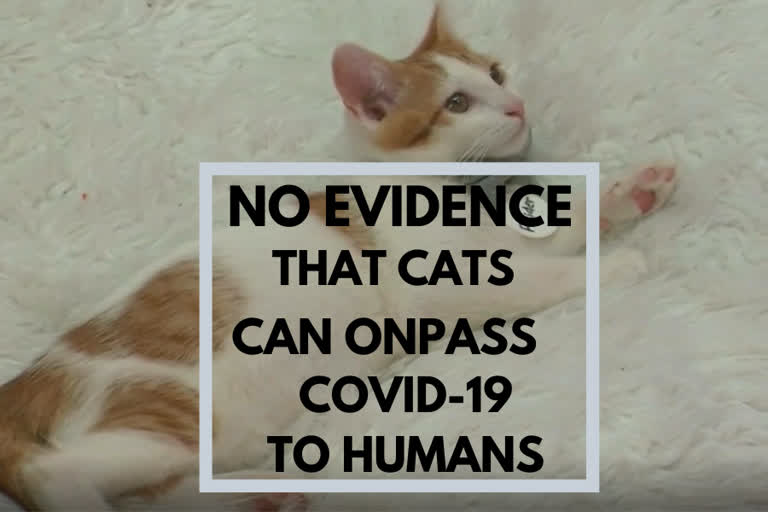An experimental Chinese study shows cats can catch COVID-19 and may pass on the virus to other cats in close proximity.However veterinarians are urging that the Chinese study be treated with caution as it was not peer reviewed and involved a very small sample.
A leading UK veterinary professor says there is no evidence that cats can onpass COVID-19 to humans.
What a difference a year makes.Last summer this shelter in LA opened for unwanted cats.
People are urged to come and play with the animals, hopefully to form a bond them, adopt one and give it a loving home.With so many people self-isolating against the virus, household pets have become a lifeline for many.But the pandemic of COVID-19 has repeatedly raised some concern among pet owners.
Some fear they could pass the virus to their animals, others worry about catching the virus from their cats or dogs.
Now a study by Harbin Veterinary Research Institute in China shows cats can be infected by COVID-19 and they can transmit it to other cats.The scientists took five cats, gave them high doses of the virus through their noses, and then euthanised two of these cats after six days.Examination of the dead cats showed their respiratory tract had been infected.The remaining infected cats were placed in cages next to a second group uninfected cats.
Also Read: Strong disinfectants may be harsh on your skin
After several days one of the second group of cats was found to be infected with the virus, which the researchers suggest must come from droplets breathed out by the infected cats.While the experiment may show that transmission from human to cat, and cat to cat is possible, Professor Ken Smith, is a specialist in animal pathology at Britain's Royal Veterinary College says we ought to exercise caution about the results.
"That was a high dose of virus, so that's some likely unnatural situation, but the other fact is that the transmission to a single cat was based on those cats being in very close proximity, so in adjoining cages for a prolonged period. So for several days. So already one is beginning to depart from the situation in nature," says Smith.
The study at Harbin, although published, has not yet been peer reviewed which means other scientists have not been able to scrutinise whether the results of the tests are repeatable, and whether they are flawed.
Smith says: "I would be very, very cautious indeed about over interpreting the transmissibility of that virus from cat to cat on the basis of an experimental study that but there's no evidence at all in natural infections of cats, which are very rare indeed, that those infections can be transmitted cat to cat. So I think we need to be very cautious about that Chinese study."
Earlier this month the Bronx Zoo in New York confirmed a tiger that tested positive for the new coronavirus. The big cat in question was the zoo's 4-year-old Malayan tiger named Nadia.Six other tigers and lions that had also fallen ill are also believed to have been infected by a zoo employee who wasn't yet showing symptoms.
Also Read: As per GoI, Aarogya Setu App is now with more than 3 crore Indians
The first animal started showing symptoms March 27, and all are doing well and expected to recover. The zoo has been closed to the public since March 16 amid the surging coronavirus outbreak in New York.
"The zoo data also, as has reported, that indicate that a small number of other tigers and lions at the Bronx Zoo are also showing signs of COVID-19, although to my knowledge it's only the single tiger, the Malayan tiger which has been proven to be infected with the virus but again, one's thinking about a human to cat transmission, there's no evidence apart from that single Chinese study, that cats can transmit the virus either to other cats, or especially importantly, not to people. So there's no evidence that cats can transmit COVID-19 to people after they become infected," says Smith.
Cat owners who suspect they have the virus are being advised to have minimal contact with their animals and to wash their hands regularly when they do.
Smith says: "The virus theoretically might also be transferred from an infected person onto the fur of their cat, for example, through stroking or petting the cat, and so the rationale for keeping the cat indoors until the person is recovered, is that the cat doesn't act as a vehicle if I can use that term, in transferring the virus on its fur and then if it's stroked or petted by someone outside, that the virus is then transferred, transmitted to that person.
So those are the those are the guidelines which are currently being recommended by the veterinary bodies."
Cat owners who suspect and know that someone in their household has COVID-19 should try to keep their animals indoors, says the British Veterinary Association (BVA), but only if the cat will not be caused stress by being kept in.For the time being it seems our cats probably have a little more freedom to explore the outdoors than we do.
For most people, the new coronavirus causes mild or moderate symptoms, such as fever and cough that clear up in two to three weeks. For some, especially older adults and people with existing health problems, it can cause more severe illness, including pneumonia and death. The vast majority of people recover.
Also Read: NASA didn't predict earthquake, Delhi-NCR jolted anyway
(Inputs from APTN)



